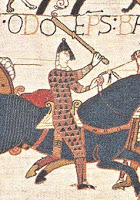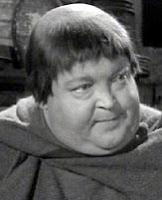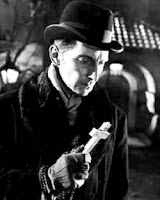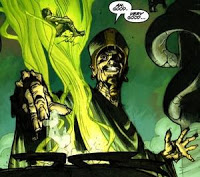 Of course, two days after I announce my hiatus, what happens? I get inspired to write something. Go figure.
Of course, two days after I announce my hiatus, what happens? I get inspired to write something. Go figure.
I got to wondering why, exactly, we have both magic-users and clerics in A/D&D. The literary antecedent of the magic-user is well-established, going back into the hoary mists of time itself with such figures as Merlin and Apolonius of Tyre. The connection to the cleric is not nearly so cut-and-dried, and it requires a little bit of digging to really put it into shape.
Gygax himself stated on several occasions that the historical template for the cleric class was Bishop Odo of Normandy, who fought at Hastings in 1066 and was famed for using a mace as his weapon so as to avoid breaking the Christian prohibition against spilling blood (in a very cynical way, of course), mixed in with a lot of  Friar Tuck (who fought, if I’m not mistaken, with a sword). The prohibition against edged weapons was as much for game balance originally as following any sort of historical pattern. However, I note that Gygax also stated that the clerical spells were created whole-cloth from his imagination (although I cannot imagine that the Biblical miracles from the Old Testament did not inform those imaginings; healings, creating food, curing disease, etc.). We are further told that the class was originally conceived as a sort of
Friar Tuck (who fought, if I’m not mistaken, with a sword). The prohibition against edged weapons was as much for game balance originally as following any sort of historical pattern. However, I note that Gygax also stated that the clerical spells were created whole-cloth from his imagination (although I cannot imagine that the Biblical miracles from the Old Testament did not inform those imaginings; healings, creating food, curing disease, etc.). We are further told that the class was originally conceived as a sort of  vampire-hunter (hence the ability to turn undead) a-la Abraham van Helsing.
vampire-hunter (hence the ability to turn undead) a-la Abraham van Helsing.
In the pulp fantasy literature whence the D&D game evolved, priests are rarely given a spotlight as something unto themselves. We’ve seen Bishop Odo, Friar Tuck, and Abraham Van Helsing, but if you look through the “high priests” of Conan, they are either simple scholars or cunning wizards who owe their dark powers to the same eldritch forces as his simple wizardly foes. Too, in Lovecraft, no distinction is made between those wizards who make use of magic owing to their own prowess (or the possession of some damned book and its wisdom) as those who call upon some nameless horror from beyond for their power. In fact, I am hard-pressed to think of a figure from either pulp fantasy or high fantasy that embodies the attributes of the cleric class; healer, hobbled warrior, undead-hammer. Until after the publication of D&D, of course.
So I’m thinking, why have a cleric class at all? Why not just fold the clerical spells into the magic-user spell list, and take their single special power (turning undead) and turn it into a couple of spells? There would be a Turn Undead I, which is a first-level spell and works against the lowest-level undead, then a Turn Undead II, etc (reversible, of course). That would actually seem a lot more in line with the classic figure of the necromancer as a magic-user specialty. It would also enable us to extract the Turn Demon/Devil function into its own spell, thus giving us a little more definition to the sorcerer specialty.
 Gone would be the ability to simply pray for spells, unless we had a sorcerer (who derived his power from otherworldly creatures) with such as a special ability. Or even turn *that* into a spell unto itself (the magic-user always makes sure to keep that one in reserve, to be able to re-memorize spells) or added as a function of the familiar; the Otherworldly Tutor, who can help a magic-user regain spells in the absence of his or her spellbook. Oh, the more I think about *that* the more I like it. It seems very Faustian.
Gone would be the ability to simply pray for spells, unless we had a sorcerer (who derived his power from otherworldly creatures) with such as a special ability. Or even turn *that* into a spell unto itself (the magic-user always makes sure to keep that one in reserve, to be able to re-memorize spells) or added as a function of the familiar; the Otherworldly Tutor, who can help a magic-user regain spells in the absence of his or her spellbook. Oh, the more I think about *that* the more I like it. It seems very Faustian.
These spells would actually allow us to develop a much more robust system of magic-user specialization than would otherwise be the case (if the harried DM were so inclined).
The more I think of it, the more I like this idea, but I would like to hear from my Dear Readers as to what you perceive as the pitfalls (and possibilities) of such a realignment of magical power.
EDIT: Now that I ruminate on it, I think the notion of having to take undead turning as a spell lines up very well with what I’ve written earlier about the concept of old-school games as logistical challenges.









I'm actually for keeping the cleric, as the two classes fill very different niches in a party.
From a RP standpoint, a mage has at least to my mind always been a secular character — if not for the fact that gods in many FRPG worlds frequently and unmistakably make their presence known, an athiest mage would not be unthinkable.
Clerics, OTOH, if played correctly, have to be played with the gods in mind, and as I'd said before, religion of one sort or another plays a large role in most fantasy settings. Someone has to make the appeasements of the gods before battle, or plead with the god of the dead to allow a party member to come to life — I just don't see a mage who may or may not be invested in religion doing that.
Mechanically, yeah, the two classes could be folded in with little disturbance. But personally, I like the fluff part of having a dedicated holy (wo)man in the party.
I heartily concur about the role that religion should properly play in any fantasy setting. However, it begs the question– if religion is so important, why limit it to a single class option?
The way I envision things, the elimination of the cleric as a class actually broadens the impact of religion on the campaign. The high priest of the God of Thieves is himself a thief, rather than just a cleric with a few thief levels tacked on for show. The high priestess of the Goddess of War would be a fighter, rather than a cleric who happens to be able to use a sword.
Bear in mind, supernatural intervention from a deity is something that should, in all but the most magic-rich environments, be rare.
You say that mages who are not interested in religion are most properly restricted from, for example, casting raise dead. However, I would point out that there are umpteen clerics out there who pay little mind to religion (despite what we, as game masters, might think is otherwise proper). How many DMs have said, "No, sorry, you have not been properly pious, so the spell fails." You might cite yourself as an example, but if so I would say you're an outlier. Spells are, by and large, mechanical be they clerical or magical; you memorize it (or pray for it), you have it, you cast it. How many DMs have even read pp. 9-10 of Deities and Demigods, which discusses such things? Precious few, I'd warrant.
And besides, nothing says that one cannot have a "dedicated holy (wo)man in the party". But cogitate on this; why does such a person have to be a cleric? I think eliminating clerics opens the door to the possibilities of the devout thief, or fighter. Does devotion automatically have to mean spells? I'm not so sure, especially if you're trying to emphasize role-playing over mechanics…
I have done away with the cleric and merged spell lists and I like it! The distinction between magic & non-magic is much clearer, and magic is it's own miraculous science.
I have contemplated making a tri-fold 'magic-user' class, with spell selection depending on Prime Requisite (INT, WIS, or CHA).
INT would use the standard M-U spell list, WIS would use a combined Cleric/Druid spell list, while CHA would use the Illusionist spell list (expanded with UA spells).
Class characteristics would otherwise be the same as the standard magic-user class.
I've also done something in the other direction in post-apoc/fantasy mashup, keeping M-U and Clerics while adding a Cha-based 'Psionicist' class.
I've got them posted on the start of a gameblog here (on the sidebar at right):
http://mutantsmagic.wordpress.com/
Abso-bloody-lutely. "Kill the Cleric; Keep the Thief" is something I find myself saying a lot lately.
I think it is a wonderful idea. I have been looking at doing this for some time and, to be honest, no one in my group has played a cleric in years. They find the other classes more interesting.
My only question is, what of the druid? would that class go away with the cleric to deepen the mage or would it still be used as is?
I tend to think of the cleric as the holy warrior, rather than the religious leader. He may not be as good a fighter as the fighting man, but Clerics easily trump Thieves, and Wizards in martial combat in nearly every edition. Great armor, To-Hit, and powers over life and death granted by the gods. Why bother with the paladin?
I'm primarily a GURPS player these days (when I can play at all), but main thing I've done with GURPS is D&D-style fantasy. I even populate my adventures with critters from my old 1stEd AD&D books and recycle the old modules :-).
In the basic GURPS magic system, there's no distinction between clerical magic and other forms. More recently, I've been pondering a modified system which, among other things, brings in the idea of 'assisted' magic.
The idea is that, while any mage can learn to heal, etc., some 'shortcut' the process by establishing relationships with one or more powrful extra-planular creatures in order to be able to cast more (or more powerful) spells, or to be able to produce effects they don't actually know the spells for. Of course, nothing in life is free, especially magic. So how much help you get determines what you owe.
I figure this would be a nice way to get the best of both worlds, if someone were able to cook up the mechanics for it.
I forbade clerics since the very first time I was running a game; and it looks like I won't be allowing them in future games.
Did you ever look at Earthsea? There, the border between wizards, druids and clerics IS really blurred.
Josh– merging the druid into the magic-user would certainly give new meaning to the term "hedge wizard". 😉
My current gaming project involves doing something similar. Rather than make cleric its own class, I'm lumping the spell list together and saying "Some priests are also sorcerers, but not all of them have magic." It'll also have the benefit that I'm not obligated to write gods into a setting where they don't fit.
Also up for debate is whether or not to remove healing spells entirely, but a change that major has profound effects on the whole system, so I'm still on the fence about it.
Yes, I'm definitely heading to a place where "priest" is an occupation, just like "innkeeper".
Just as you can have a 6th level fighter who's an innkeeper, so you can have a 5th level magic-user (or a 9th level thief, or whatever) who is a priest.
I think that for certain campaign worlds, it makes a lot of sense to combine the rolls of the cleric and magic user.
I would also advocate different schools of magic, which would allow one person to focus exclusively on a given type (e.g. healing/life, knowledge, summoning, death/necromantic) as this appears in many campaign worlds as well.
Does anyone know the reasoning behind giving clerics bonus spells for high WIS in AD&D, while not doing the same for magic users? Could it be a nod towards the cleric in his party roll as "healer of others"?
Im a big fan of Priests myself, but I never liked the way D&D half-assed merged it as a "Fighter/Wizard". I always thought that Priest Characters needed a vast overhaul. You actually made me decide to change my post for today.
I've already removed the cleric from my campaign, conflated the two sets of spells and added undead-turning as a spell.
I've introduced some add-on "sub-classes" that can be attached to the base classes — one of the sub-classes being "Priest". So, you could have a fighter-based priest, or a magic-user-based priest, or even (for NPCs)… just a priest. The sub-classes have an XP cost associated, so a fighter-priest would require 25% more XP per level than a plain fighter, in return for which he or she gets access to certain level-dependent priestly powers.
So far I haven't found any negative issues with getting rid of the cleric as a separate class, and in fact the class+sub-class system has freed things up rather well.
My reason for having priests is I want a different magical option. With emphasis on different. Priests should have unique mechanics not just different spells. I'm for merging spell lists but also changing the cleric class.
For my next game I'll use something like Zzarchov's. There will be holywarriors, sorcerous priests(aka pious magic users), and miracle-workers. 95% or priests will be mundane, but that other 5% are blessed by the gods and granted the power of miracles!
Well, when you roll your 3d6 and come up with WIS 16, what're you gonna do? Aside from a +2 bonus to saves vs. mind-affecting magic, of what use is it? I guess you could still be a monk or paladin, or some other class that "knows thyself" and is unusually dedicated to its values. Or, just chuck wisdom and all related classes/sub-classes.
On the one hand, yes they're superfluous. The game might have been better without them.
On the other hand, eliminating them causes too many problems to be worth it, IME. I'd rather just downgrade their importance.
I've come up with a class that I call the "magician" that is designed to replace both the magic-user and cleric classes. I've also divided all the (merged cleric & m-u) spells into 'white', 'grey', and 'black' magic categories.
So far it's been working well in my games!
For more info on my system, go here:
http://akraticwizardry.blogspot.com/2009/07/magicians-and-colours-of-magic.html
You might be interested in this thread from over at Knights & Knaves, Joe: Cleric as an Archetype. Amongst other things it eventually got to the bottom of where the myth of Odo's club came from [i.e. which book Gygax likely read it in].